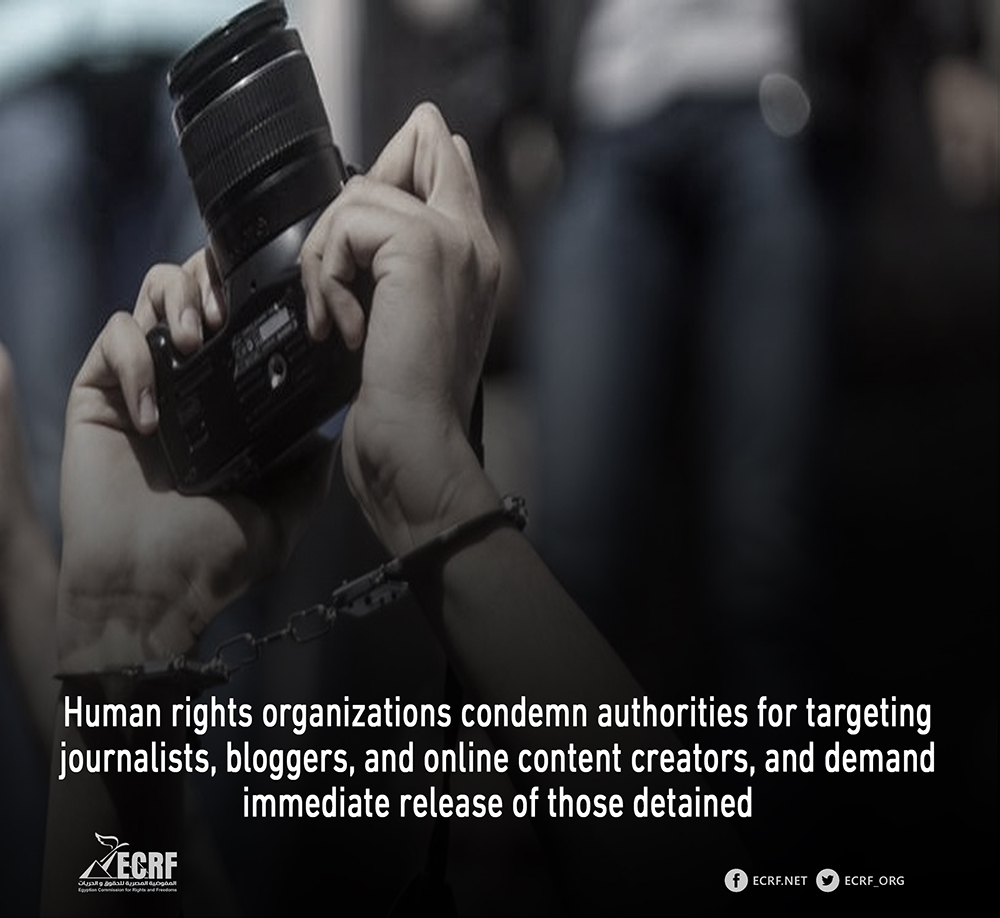The undersigned human rights organizations condemn the Egyptian authorities for the continued imprisonment of journalists, bloggers, online content creators, and others under Case no. 440 and Case no. 441 of 2022. The combined group of defendants in cases no. 440 and no. 441 faced the same list of charges, all of which are based on national security investigations, despite the array of differences in regards to their fields of work and the circumstances and timing of their arrests and investigations.
The organizations demand the closure of the cases no. 440 and 441, and the immediate release of all charged and detained under the two cases. The organizations further demand a halt to the use of dubious charges – such as “joining a terrorist group” without specifying the group, and “spreading false news” through social media. Such charges are frequently used to retaliate against anyone exercising their human right to express an opinion or engaging in criticism or analysis of public affairs or current events.
The organizations also denounce the Egyptian authorities’ perpetration of these violations in conjunction with the call for a national dialogue, which is supposed to accommodate all critical opinions and include a diverse array of opposition representing a broad political spectrum. There have been many pledges by Egyptian President Abdel Fattah al-Sisi to activate the Presidential Pardon Committee to release political prisoners and prisoners of conscience, not send more of them to prison.
On 20 July 2022, the Supreme State Security Prosecution renewed the detention of journalist and television host Hala Fahmy for fifteen days in connection with Case no. 441 of 2022. Fahmy was arrested last April, due to her solidarity with and participation in workers’ protests at the Radio and Television Union Building in Cairo (Maspero), and for her critical views of the Egyptian economic situation. The same case also includes journalist Safaa Al-Korbiji, who was arrested on 20 April 2022 and faces the same charges after sharing videos of protests inside Maspero. The protests, which had begun earlier this year, demanded improved working conditions from the management of the National Media Authority.
Journalist Donia Samir was arrested last June and charged under Case no. 440 of 2022, after she published a video showing herself being harassed by the governor of South Sinai. The indictment included three other online content creators known as “Thorafaa El Ghalaba” (the funny poor); they were detained for a period before being released last May.
On 15 May 2022, security forces arrested journalist Mohamed Fawzy after he shared a video of himself criticizing Ramadan rituals of Egyptian families and demanding the release of political prisoners. Two weeks after Fawzy’s enforced disappearance, he re-appeared before the Supreme State Security Prosecution in the same case, facing the same list of repeated accusations. His detention continues to be renewed. Shady Sharaf El-Din was also recently added to Case no. 440 on 15 July, after he posted a video of himself burning the Israeli flag in the street. Sharaf El-Din was disappeared for a week after his arrest on 9 July, when he was detained at the National Security headquarters in Maadi before appearing before the prosecution. Several others were arrested and included in the case after they posted videos on TikTok.
Such cases are dependent on a list of repeatedly-used and predetermined charges, and based entirely on biased National Security investigations approved by the Supreme State Security Prosecution. As a result, people waste years of their lives in pre-trial detention or imprisonment following unfair trials, as part of a broader campaign aimed at seizing all forms of the right to free expression, monitoring personal accounts, and tightening security control over traditional and online media platforms, including by blocking or eliminating them.
The signatory human rights organizations reassert their demand for the immediate release of journalists, bloggers, and content creators detained for exercising their right to express their opinion on social media. We call on the Egyptian authorities to stop using terrorism charges to prosecute those with opinions that diverge from the government’s narrative.
Signatories:
Cairo Institute for Human Rights Studies
Egyptian Front for Human Rights
El Nadim Center
Committee for Justice
The Freedom Initiative
Egyptian Commission for Rights and Freedoms

